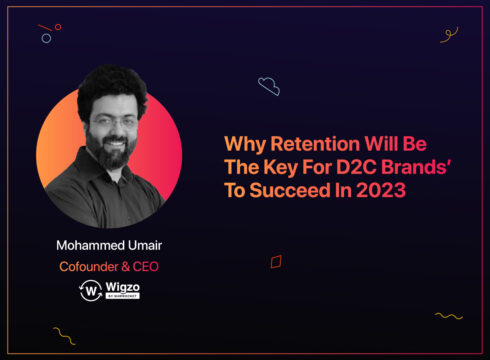In the wake of a harsh funding winter, ecommerce brands are focussing more on brand building instead of opting for deep discounts to increase sales
During a freewheeling chat with Inc42, Mohammed Umair, cofounder and CEO of the martech platform Wigzo, referred to D2C brands as real-time IPs, which saw rapid growth due to their originality
Wigzo is keen to expand its global client base and aims to foray into the EU and Australia
Inc42 Daily Brief
Stay Ahead With Daily News & Analysis on India’s Tech & Startup Economy
In the early years of Indian ecommerce, brands used to offer deep discounts to attract and incentivise customers. Their purpose was twofold. In the short term, it helped them gain the much-needed traction from their respective target groups (TGs) and boosted a prospect’s confidence in online shopping. In the long term, they hoped to grab a substantial market share from legacy players.
This strategy worked well as long as there was enough funding to support the cash burn. But the market dynamics changed in the wake of the pandemic, and a new set of digital-first, direct-to-consumer (D2C) brands rose to prominence due to their lean business strategy, fast turnaround and deeper customer engagement. They depended less on price or percentage discounts to boost their sales as it came with some serious tradeoffs.
For context, the Indian D2C market opportunity is estimated to reach $302 Bn by 2030, growing at a CAGR of 24%, according to an Inc42 report. The overall ecommerce market is set to hit $400 Bn by that time.
Discounting might have been a hard habit to break in the ecommerce context. But the onset of a harsh funding winter in 2022 has compelled all cash-guzzling digital commerce entities to hit the pause button on their growth-at-all-costs strategy. On the other hand, the D2C subsect seems to have found the sweet spot that will help improve conversions and increase sales without draining the margins.
Mohammed Umair, cofounder and CEO of Wigzo, an AI-driven marketing automation platform for ecommerce, also noted this significant change in the strategy of many new-age brands pushing sustainable growth.
“D2C brands have been averse to discounts in 2022. They did not want to dilute their brand [value] by discounting. Instead, they said they would invest more in brand building,” said Umair.
Watch Tapanjana Rudra of Inc42 in conversation with Umair Mohammed, founder and CEO of Wigzo, on the latter’s core learnings as a founder, Wigzo’s growth journey from launch to acquisition by Shiprocket, and the road ahead.
Wigzo and its ilk are critical enablers in the ecommerce space, analysing billions of data points to provide actionable insights to brands looking for hypergrowth in the new normal.
Referring to the D2C brands as intellectual properties (IPs) created in real time, Umair noted that these IPs saw unprecedented growth during 2020 and 2021.
The rapid growth has made it possible for several top D2C brands to compete with FMCG majors and retail giants like HUL, Trent (a Tata Group Company) or Aditya Birla Retail for a prime spot on a consumer’s shopping list.
“This is because they are not copycat products. They all have a hypothesis behind creating their brands,” said Umair.
Brands leverage Wigzo’s bouquet of solutions to engage consumers through meaningful content and effective micro-messaging. It makes them more relatable in terms of value generation and trust building as new-age users always look beyond the product value and explore company ethos such as sustainable manufacturing, fair trade practices and procuring organic products, added Umair.
Wigzo boasts more than 400 enterprise clients and claims to have helped many brands increase their gross merchandise value (GMV) by 20-26%.
The platform was acquired by logistics unicorn Shiprocket in Jan 2022. Going ahead, it would focus on deeper integration with the ecommerce ecosystem, added Umair.
“Wigzo intends to solve challenging data problems, not only from the martech point of view but also from the standpoint of business intelligence and analytics on the supply side,” he said.
The company is also looking to enter more global markets. Currently, it claims to service a heavy client base across sectors in the US and has a presence in Saudi Arabia. It is looking to make a foray into the EU via Germany, and Australia will also be a significant market.
“We believe ecommerce requirements are global in nature. So, we are seeing heavy adoption of Wigzo solutions in our targeted geographies,” concluded Umair.
Note: We at Inc42 take our ethics very seriously. More information about it can be found here.


